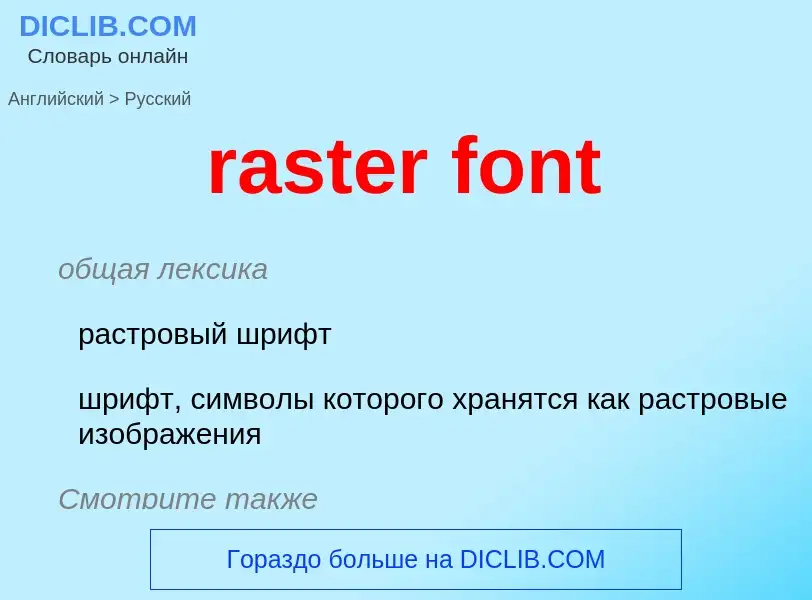Übersetzung und Analyse von Wörtern durch künstliche Intelligenz ChatGPT
Auf dieser Seite erhalten Sie eine detaillierte Analyse eines Wortes oder einer Phrase mithilfe der besten heute verfügbaren Technologie der künstlichen Intelligenz:
- wie das Wort verwendet wird
- Häufigkeit der Nutzung
- es wird häufiger in mündlicher oder schriftlicher Rede verwendet
- Wortübersetzungsoptionen
- Anwendungsbeispiele (mehrere Phrasen mit Übersetzung)
- Etymologie
raster font - Übersetzung nach Englisch
<font color="gray">общая лексикаfont>
растровый шрифт
шрифт, символы которого хранятся как растровые изображения
<font color="gray">Смотрите такжеfont>
<font color="gray">общая лексикаfont>
экранный шрифт
растровый шрифт, разработанный для отображения информации на экране компьютера
<font color="gray">Смотрите такжеfont>
<font color="gray">общая лексикаfont>
векторный шрифт
шрифт, в котором символы описываются отрезками линий и дуг <font color="gray">(bitmapped font)font>. Это позволяет программно изменять кегель такого шрифта, поэтому векторные шрифты часто называют масштабируемыми шрифтами. У векторных шрифтов отсутствуют хинты и математически определяемые кривые, применяемые в контурных шрифтах
Wikipedia
A computer font is implemented as a digital data file containing a set of graphically related glyphs. A computer font is designed and created using a font editor. A computer font specifically designed for the computer screen, and not for printing, is a screen font.
In the terminology of movable metal type, a font is a set of pieces of movable type in a specific typeface, size, width, weight, slope, etc. (for example, Gill Sans bold 12 point or Century Expanded 14 point), and a typeface refers to the collection of related fonts across styles and sizes (for example, all the varieties of Gill Sans). In HTML, CSS, and related technologies, the font family attribute refers to the digital equivalent of a typeface. Since the 1990s, many people use the word font as a synonym for typeface.
There are three basic kinds of computer font file data formats:
- Bitmap fonts consist of a matrix of dots or pixels representing the image of each glyph in each face and size.
- Vector fonts (including, and sometimes used as a synonym for, outline fonts) use Bézier curves, drawing instructions and mathematical formulae to describe each glyph, which make the character outlines scalable to any size.
- Stroke fonts use a series of specified lines and additional information to define the size and shape of the line in a specific typeface, which together determine the appearance of the glyph.
Bitmap fonts are faster and easier to create in computer code than other font types, but they are not scalable: a bitmap font requires a separate font for each size. Outline and stroke fonts can be resized in a single font by substituting different measurements for components of each glyph, but they are more complicated to render on screen or in print than bitmap fonts because they require additional computer code to render the bitmaps to display on screen and in print. Although all font types are still in use, most fonts used on computers today are outline fonts.
Fonts can be monospaced (i.e. every character is plotted a constant distance from the previous character that it is next to, while drawing) or proportional (each character has its own width). However, the particular font-handling application can affect the spacing, particularly when justifying text.

![A bitmap color font for the [[Amiga OS]] A bitmap color font for the [[Amiga OS]]](https://commons.wikimedia.org/wiki/Special:FilePath/AmigaColorFont.png?width=200)
![Perpetua]] Perpetua]]](https://commons.wikimedia.org/wiki/Special:FilePath/Comparison of printed and digital versions of Perpetua.png?width=200)

![Macintosh operating system]] Macintosh operating system]]](https://commons.wikimedia.org/wiki/Special:FilePath/Original Mac fonts.png?width=200)
